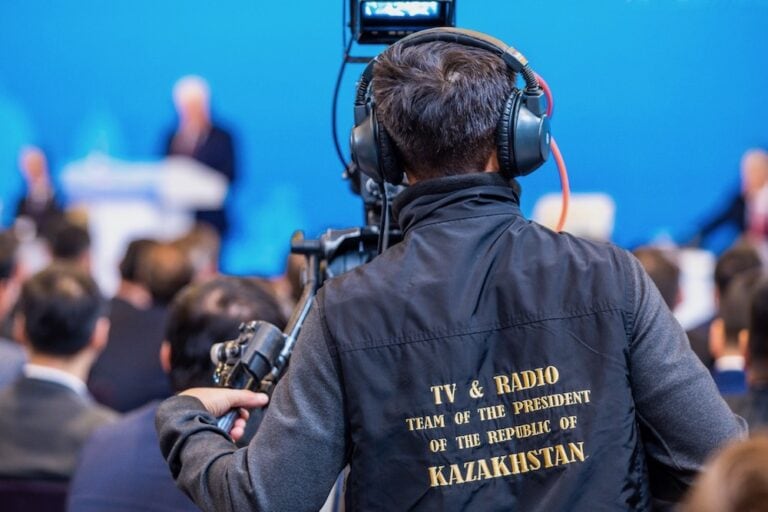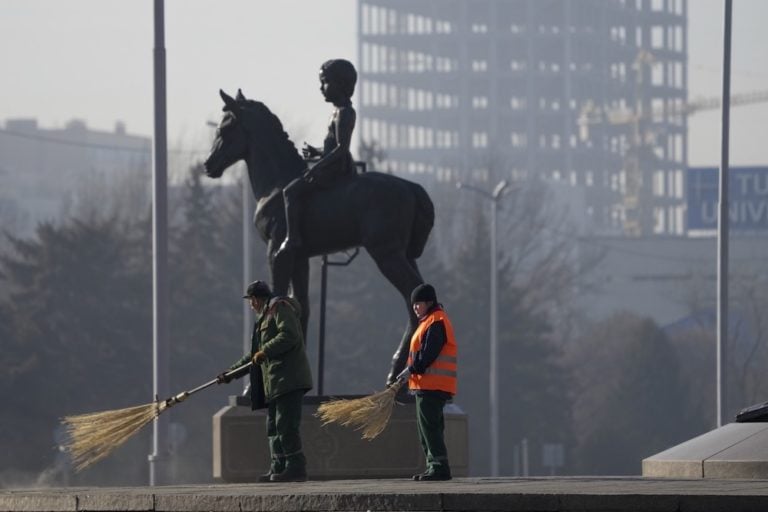Civil society activists have planned a series of rallies to mark 100 days after police opened fire on unarmed protesters in the city of Zhanaozen, andauthorities have already started to arrest and fine participants.
(Human Rights Watch/IFEX) – Almaty, March 23, 2012 – Kazakhstan police should respect the fundamental freedoms of expression and assembly and not interfere with peaceful rallies planned for March 24, 2012, Human Rights Watch said today. Since late January, when opposition activists staged the first of a series of peaceful public protests in Almaty, the authorities have responded with increasing hostility, rounding up opposition activists in advance of and during a February 25 protest, and arresting and fining participants.
Civil society activists have planned peaceful rallies in various cities on March 24 to mark 100 days since police opened fire on civilians, including striking oil workers, in the western city of Zhanaozen on December 16, 2011. The organizers are calling for a fair trial for those charged with participation in mass riots and plan a minute of silence and a prayer to commemorate those who were killed and wounded.
Authorities have already moved to prevent people from attending the rally in Almaty. At approximately 9 p.m. on March 21, five officials from the prosecutor’s office came to Azat Social Democratic Party (OSDP) presidium member Marzhan Aspandiarova’s home to warn her that she risks administrative, and potentially criminal, charges if she participates in the March 24 rally. Aspandiarova also told Human Rights Watch that last week she, in her personal capacity, had applied for permission to hold a peaceful gathering in the center of Almaty on March 24, but was denied.
“March 24 is an important opportunity for Kazakh authorities to reverse their repressive course,” said Mihra Rittmann, Central Asia researcher at Human Rights Watch. “The authorities need to show that they can – and will – respect Kazakhstan citizens’ fundamental rights to peaceful assembly and free speech, rather than punishing critics and the political opposition.”
Starting on January 28, 2012, opposition activists have held protests in Almaty, the capital, and other cities to voice grievances over rights abuses, including alleged fraud during the January 15 parliamentary elections. They have also protested the use of lethal force in Zhanaozen, and the arrests, intimidation, and harassment of opposition activists and journalists in the wake of the violence there.
Police officers stood by but did not interfere with a January 17 protest by OSDP in Almaty to contest the election results. Organization for Security and Co-operation in Europe (OSCE) observers said the election “did not meet fundamental principles of democratic elections.”
At the protest, the opposition party leaders called for a public rally in Almaty on January 28.
The following day, authorities fined party members for holding a public meeting without permission from the local authorities, a violation of the law on public assembly, under article 373 of the Code on Administrative Offenses. The law allows penalties of up to US$550 and up to 15 days of detention.
On January 28, approximately 1,000 people participated in an unsanctioned rally off to one side of the Palace of the Republic, after authorities blocked off the main square in front of the building. Participants called for an independent investigation into the Zhanaozen violence and for the release of detained opposition activists who were arrested on January 23 for alleged crimes in conjunction with their peaceful support of the striking oil workers in Zhanaozen.
Within hours of the rally’s conclusion, authorities detained Bolat Abilov, Amirzhan Kosanov, and Amirbek Togusov, opposition party leaders who had led the protest, and an administrative judge sentenced each to 15 days in detention for holding a public meeting without permission. Abilov was sentenced to an additional three days for allegedly showing disrespect after he refused to stand up before the judge at his hearing. Aspandiarova, the party’s presidium member, told Human Rights Watch that over the next few days approximately 10 others who had spoken publicly at the rally were also fined.


